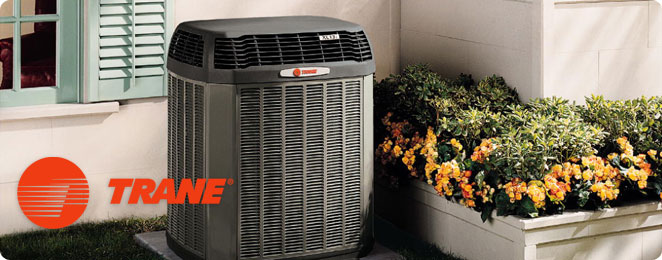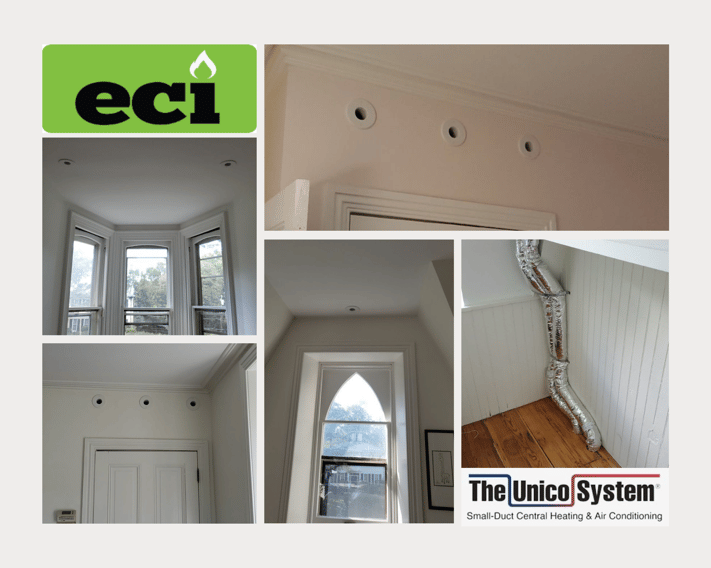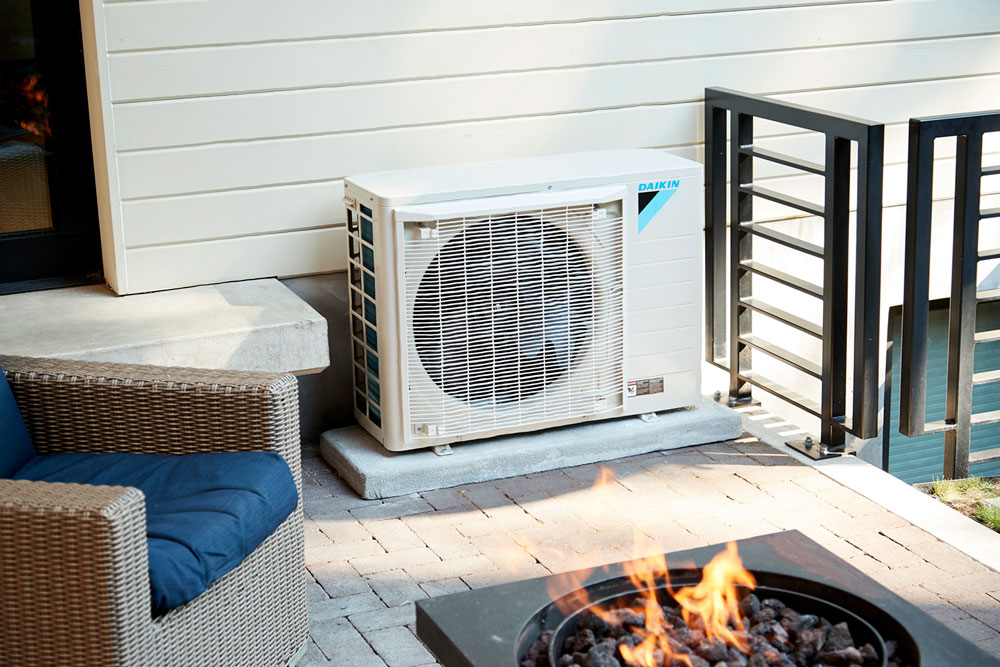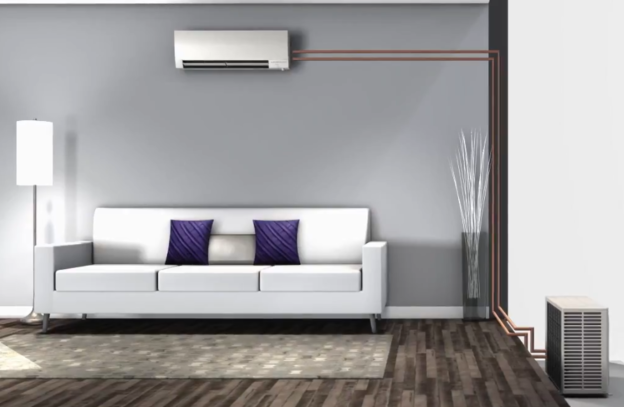Air conditioning is one of the most important home comfort factors for many of us, but deciding on the best AC system for your home can be tough. We will explain the main types of AC systems as well as the pros and cons associated with each.
Looking to upgrade from your window units or lack of air conditioning system altogether? You may be deciding between these types of systems: conventional central air, high velocity central air, heat pump, ductless heat pump, or hybrid.
You'll need to consider important factors such as your budget, the climate where you live, the type of home, the size of the home, the number of doors and windows/direct sunlight, energy consumption, and more. A professional HVAC contractor can help you decide on the best system to fit your needs and give you a proper estimate. But in the meantime, here's some helpful information.
Conventional Central AC

A conventional central air system consists of an outdoor unit that holds the condenser and compressor and an indoor unit that holds the evaporator and air handler. The system uses refrigerant to remove heat from the indoor air and expel it outside before cool air is pushed through the ductwork and into the home.
Advantages
A central AC system that utilizes ductwork is able to cool all the rooms at once, creating a regulated and even environment. Since cool air is circulated in every room, humidity is also reduced around the house, making the overall environment more comfortable. Central air systems are also pretty low maintenance and easy to use. If you have a forced-air furnace, the air conditioner will use the same ducts that are already in place. These systems can be more affordable than heat pump or high velocity systems.
Disadvantages
Installing a central AC system requires a lot of space and intrusive work in the home -- which can also be expensive -- if you do not already have ductwork. The ducts themselves may need to be cleaned from time to time and can also get things stuck in them, which can cause issues for your HVAC system. There's the possibility of leaky ducts, as well, which will reduce efficiency and cost you more money. Traditional central air is the least efficient compared to other systems.
Should I get a central air system?
A typical central air system may be right for you if:
-
You have adequate indoor space for installation
-
You already have a forced-air furnace
-
You are looking for a whole-home solution
High Velocity Central AC

Like a typical central air conditioning system, a high velocity system uses an outdoor unit, indoor unit, and ductwork to distribute cool air throughout your home. The main difference is the size of the ducts: high velocity systems use small tubing that can fit in places traditional ductwork cannot.
Advantages
The small tubing fits well into older homes without ductwork and requires a less intrusive installation than traditional ductwork. Because of its size, it can also be weaved through wall cavities and floor joists. Additionally, it mixes the air very well through a process called aspiration. This process eliminates drafts, provides even temperatures throughout the room, and reduces 30% more humidity than traditional systems.

Disadvantages
The upfront cost of a high velocity system is more expensive than the other types of air conditioning systems. However, its high efficiency pays off over the long term.
Should I get a high velocity system?
A high velocity system may be right for you if:
-
You have an older home or a home not apt for traditional ductwork
-
You don't want to mess with the integrity of the home
-
You are looking to reduce humidity
-
You want a more efficient system
-
You aren't worried about the installation costs
Heat Pump
 A heat pump operates on electricity and essentially takes heat from one area and moves it to another. A typical central heat pump takes heat from the outdoors and moves it into your home. You may be wondering - what does this have to do with air conditioning? Well, heat pumps can actually reverse their cycle to take heat from inside your home and place it outside, while using refrigerant to supply cool air. The tempered air is sent through the ducts in your home.
A heat pump operates on electricity and essentially takes heat from one area and moves it to another. A typical central heat pump takes heat from the outdoors and moves it into your home. You may be wondering - what does this have to do with air conditioning? Well, heat pumps can actually reverse their cycle to take heat from inside your home and place it outside, while using refrigerant to supply cool air. The tempered air is sent through the ducts in your home.
Advantages
Heat pumps can cool all your rooms at once but take up less space than traditional outdoor units. They are also highly efficient, as they can deliver up to three times more energy than they consume. Heat pumps require less maintenance than other systems and are relatively simple to install if you already have ductwork. Plus, if you live in a more mild climate, a heat pump can function as both your air conditioner and heater.
Disadvantages
If you live in a colder climate, a standard heat pump won't be able to double as your heating system, as it will only work until it gets down to about 25 degrees outside. As mentioned earlier, if you don't already have ductwork, installing a central air system can also be expensive and disruptive. The other disadvantages of a conventional air conditioner apply here as well, like the possibility of dirty ductwork or leaky ducts.
Should I get a heat pump system?
A central heat pump system may be right for you if:
Ductless Mini-Splits
Ductless heat pumps work the same way as standard heat pumps, but rather than distributing air through ductwork, they use small line sets to connect the outdoor unit to air handlers directly in the rooms.

Types of mini-splits
Mini-splits come in different styles to best suit your needs. Check out the types of Mitsubishi ductless units here.
Wall-mounted
Wall-mounted units are the most popular and versatile type of indoor ductless unit. These units sit high on the wall and come in different styles to match your décor needs. They are equipped with advanced filters and are great for both residential and commercial use.
Floor-Mounted
These units sit low on the wall and are partially recessed into the wall. They are perfect for replacing radiators or heating/cooling additions and can be used in residential and commercial spaces.
Ceiling-mounted
These units can be in the form of ductless cassettes installed flush to the ceiling and ductless ceiling-suspended units for light commercial settings.
Advantages
Ductless heat pumps are the least invasive whole-home air conditioning system. They only require a small hole in the wall and are fairly easy to install. Plus, their versatility allows them to be installed almost anywhere. These systems are also most efficient when compared to conventional and high velocity systems. Lastly, ductless units are great for zoning, as each unit is individually controlled. That means you can have personalized comfort from one area of the home to the next.
Disadvantages
The biggest disadvantage is that you can see the air handlers, rather than a conventional system where the air handler may be in an attic or closet. Additionally, while zoned control can be a benefit, it can also be a burden if you want to change the temperature of your house.
Should I get a ductless system?
A ductless heat pump system may be right for you if:
-
You are cooling a smaller space
-
You have several rooms in your house that aren’t used regularly
-
You want zoned control
-
You want a minimally invasive system for a historic or older home
-
You are looking for higher efficiency and money savings
Hybrid / Dual-Fuel AC
A hybrid system combines a gas furnace with an electric heat pump to deliver efficient heating and cooling. In the summer, the heat pump will pull hot air from your home and send it outdoors. In the winter, the system will switch between the gas and electric heat based on the temperatures outside.
Advantages
A hybrid system maximizes comfort, efficiency, and energy savings while lowering your carbon footprint. Using a supplemental heat pump will put less stress on both systems and extend the life of both as a result. Heat pumps are also easier to maintain than other types of cooling and heating systems.
Disadvantages
Installing two systems can have a higher upfront cost. And while you will lower your heating/cooling bills, you will increase your electric bills.
Should I get a hybrid system?
A dual-fuel system may be right for you if:
- You are looking to reduce your use of fossil fuels
-
You want to combine your heating and air conditioning
-
You want to maximize efficiency
If you live in the Delaware Valley/Greater Philadelphia area and would like to find comfort within your home, visit our website or give us a call at 215 - 245 - 3200 to learn more.





